JFK (1991)
New Orleans District Attorney Jim Garrison discovers there's more to the Kennedy assassination than the official story.
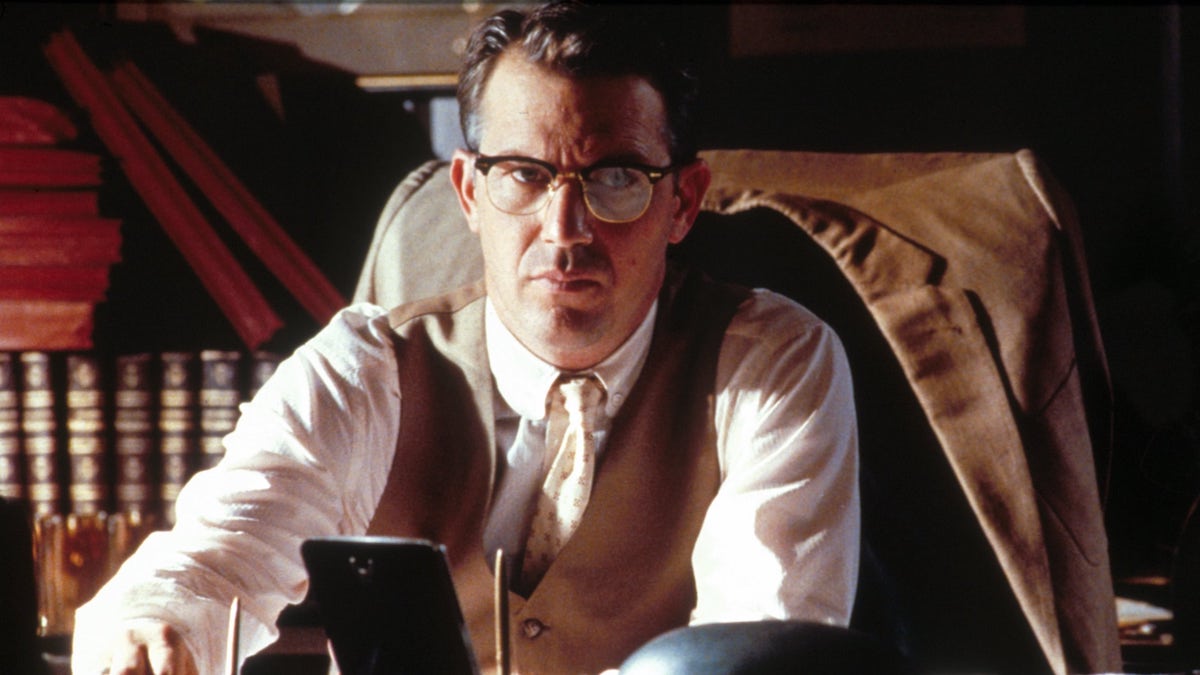
New Orleans District Attorney Jim Garrison discovers there's more to the Kennedy assassination than the official story.

The producer of Oliver Stone’s JFK was A. Kitman Ho, on the surface seemingly a straightforward enough movie-business guy with credits including Talk Radio (1998) and Hotel Rwanda (2004) as well as several other Stone movies. But wait—his name is an anagram of “A hitman, OK?” What message is this sending us? Did Hillary Clinton, or maybe Bill Gates, somehow manage to get him the JFK job just to encode the secret of the Kennedy assassination within its very credits? Wake up, sheeple!
Conspiracy theories are easy to satirise, and indeed they were easier in the 1990s, when they were far less mainstream; the concept of Conspiracy Theory (1997), with Mel Gibson as a tinfoil-hat wearer who for once is right, was marketable precisely because characters like his were perceived as so fringe and eccentric. Stone’s JFK, however, treats them absolutely earnest seriousness, and the result is a film which is strange and puzzling at the same time as it’s undeniably entertaining.
Does it really believe what it’s saying, that the US military-industrial-intelligence-political establishment organised the assassination of John F. Kennedy in 1963 because he might get the country out of the Vietnam War? It devotes most of its hefty runtime to implying exactly this, but then even its lead character, New Orleans district attorney Jim Garrison (Kevin Costner), admits that he doesn’t know what the conspiracy is, just that there seems to be one. He even admits he might be wrong.
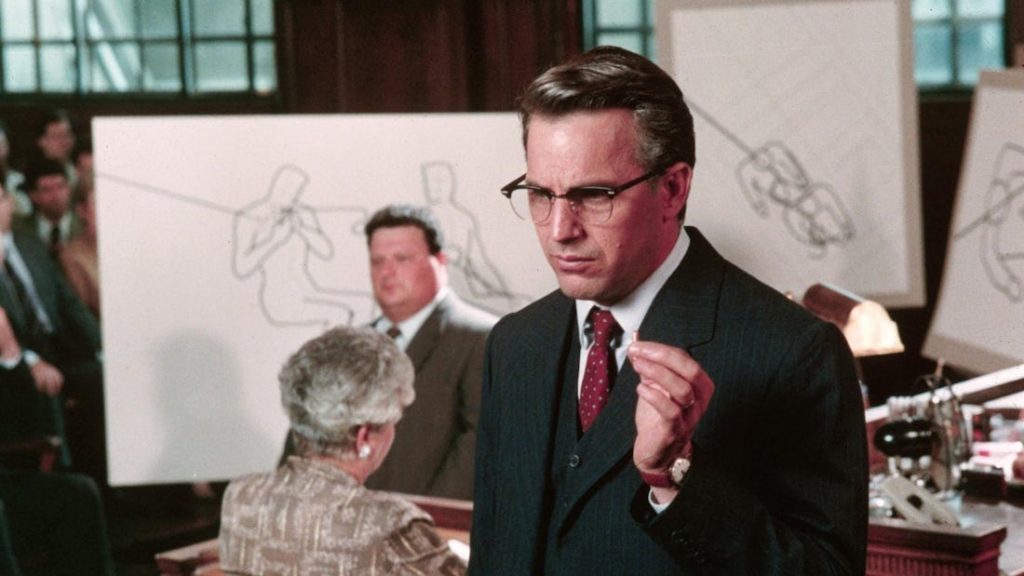
Or is JFK actually more thoughtful than it looks, trying not so much to reveal “the truth” as to illustrate how difficult identifying the truth can be, and how accepted truths are shaped? Is the movie itself gullible, or is it just asking questions? Is it treating its viewers as naive recipients of revelation, or is it simply asking them to evaluate and reconsider, and to remember that just because you’re paranoid doesn’t mean they’re not out to get you?
Criticism of JFK at the time and since, and there has been a lot, often tends to take its baroque conspiracy-theorising at face value and to presume that Stone is trying to solve the mysteries of the Kennedy assassination once and for all. To be fair, I don’t think he is—JFK isn’t insisting “this is the truth”, merely saying “the truth could be something as worrying as this”—and indeed Robert Richardson, cinematographer on JFK and a favoured Stone collaborator, compared it to Akira Kurosawa’s Rashomon (1950) in deliberately presenting conflicting versions of events.
So the failing of the film is not, as many critics and Kennedy assassination buffs at the time and since have contended, that it gives an incorrect answer to the question of “who shot JFK?” It’s not trying to give “the answer”. The real failing is that this isn’t clear, and Garrison’s—in effect Stone’s—admission that the whole thing’s a stab at highlighting unanswered questions, rather than an answer, comes far too late (and too briefly and casually) in the movie.
This problem affects the whole film. It’s heavy on the factual, or what is presented as factual; why so much, if the point is unknowability rather than disclosure? And even there it can be verging on the duplicitous, for example by leaving out any of the evidence that suggested Lee Harvey Oswald was guilty of the assassination, and in its own presentation. Stone has claimed, for instance, that its mix of black-and-white and colour is transparent: the monochrome footage, he said, is speculative and the colour is established truth. But this isn’t true; there is fictitious colour material, as well as archival monochrome.
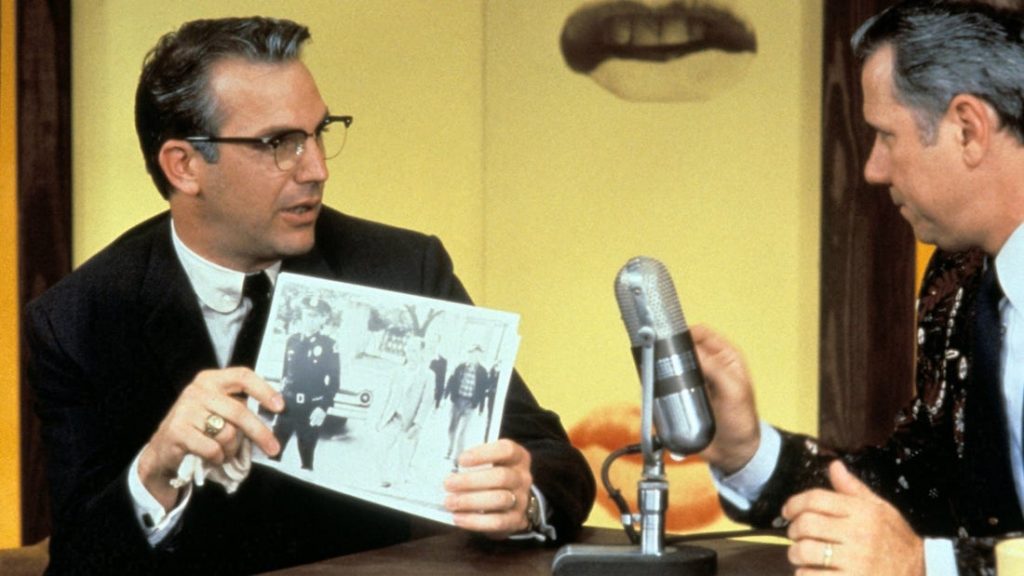
The outcome is a film guilty of the very things it accuses others of. We can’t trust the US government’s Warren Commission in its conclusions on the assassination, JFK says, because so much important information has been occluded or distorted. Yet while that’s true (the idea of Oswald as a lone-wolf killer is surely difficult to accept), we can’t really trust JFK either, for precisely the same reasons. This wouldn’t matter except that it does seem to ask us to trust it.
Politically controversial subjects were nothing new to Stone even this early in his career: he had already examined US involvement in Central America in Salvador (1986), financial malfeasance in Wall Street (1987) and Vietnam twice (in 1986’s Platoon and 1989’s Born on the Fourth of July). Later films would revisit Vietnam as well as considering President Nixon, Edward Snowden and 9/11.
But none of these excited quite the same controversy as JFK, and it was undoubtedly exacerbated by his choice of Garrison as protagonist and Garrison’s own book On the Trail of the Assassins as his main source material (along with Crossfire: The Plot That Killed Kennedy by the journalist Jim Marrs). After all, long before Stone’s movie, Garrison himself had been attacked for his methods and for the shaky case he brought against Louisiana businessman Clay Shaw over involvement in the assassination. (Garrison has a small role in JFK, cast with obviously deliberate irony as Earl Warren, the Chief Justice who gave the Warren Commission his name.)
The film follows Garrison closely, after a lengthy introductory montage including President Eisenhower’s departing speech on the military-industrial complex, clips of John F. Kennedy and Martin Luther King, and so on. (JFK echoes the texture of these throughout and it’s often hard to tell what’s real and what isn’t; again, maybe that itself is the message, but if so it’s a very very subtle message to entrust to a multiplex movie.)
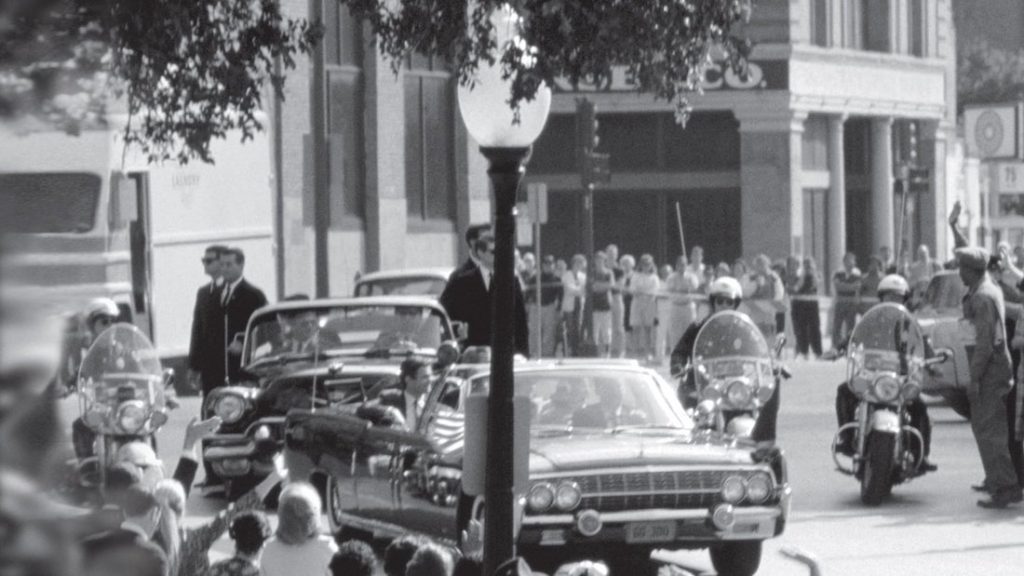
The Kennedy assassination itself takes place close to the start of the movie, and the bulk of it then unfolds in the late-1960s. Garrison, initially just making routine enquiries into possible New Orleans links to the killing, ends up launching a much deeper investigation into Shaw (Tommy Lee Jones), who he suspects of being involved in a plot. He is backed up by a small team, notably Jay (Lou Ivon) and Bill (Michael Rooker), but they are decidedly secondary to the Garrison character and also pale alongside some of the witnesses he interviews, especially David Ferrie (Joe Pesci), “Mr. X” (Donald Sutherland), and Willie O’Keefe (Kevin Bacon). Lee Harvey Oswald (Gary Oldman) never appears directly in the action, but frequently in flashbacks.
Shaw and Ferrie were real, as of course was Oswald; Mr. X is based largely on the real Fletcher Prouty; O’Keefe is a composite. And so it goes on: the film takes pains with historical accuracy at times, right down to Ferrie’s wig and fake eyebrows, but happily departs from it at others. This is true of many historical movies, of course, yet in a film where the whole point is the distinction between truth and untruth it seems a dangerous course to take.
Around two thirds of the movie covers the investigation itself, and the last third the trial of Shaw. He was acquitted—Garrison couldn’t prove anything any more than JFK can—though it has to be noted that at least some of the accusations unsubstantiated at the time have since turned out to be well-founded.
As a whole it can seem like it’s never going to end, and Stone added a further 17-minutes in a Director’s Cut. But despite this it’s never tedious, and individual passages can move quickly enough, perhaps most famously Garrison’s “back and to the left” speech near the end where he seemingly proves that several bullets must have been fired during the assassination.
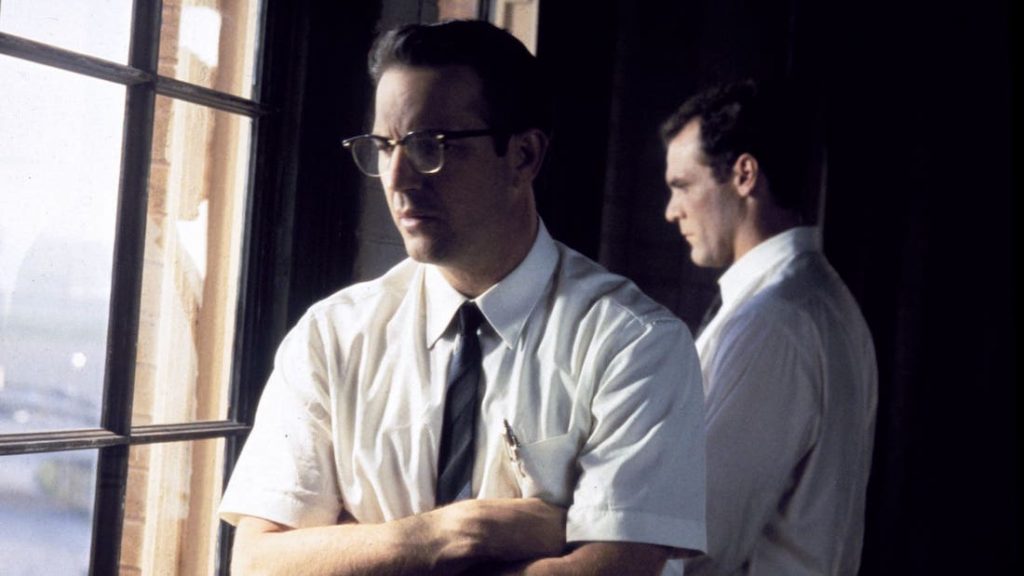
Very often, the sense of urgency (rather odd itself in a film that’s about a years-long investigation, though it’s undeniably effective) is aided by rapid cutting which was quite likely influenced by the rise of music video; JFK has sometimes been criticised for excess in its editing, though its overall average shot length of 4.6 seconds is not outrageous for its time. (Silence of the Lambs in the same year comes in at 6.4 seconds, Terminator 2: Judgment Day much lower at 3.13.)
As always, Stone’s directorial style is not radical but its certainly not naturalistic either, and here it certainly doesn’t need to be. JFK may be about a plot, but it doesn’t really have one; it’s more didactic than narrative. For instance, the parallel story of Garrison’s family, with Sissy Spacek wasted as his wife, is both cursory and completely predictable to anyone who’s ever seen a movie about a man dedicated to his work.
Equally, there’s no precise sense of the obstacles facing Garrison’s team (for instance, we learn of witnesses’ deaths almost in passing after they’ve taken place, and there is little reaction to them). There are no real doubts about their mission, one scene excepted. In the trial itself, we get no idea of the balance of testimony for and against Shaw, with Stone preferring to concentrate on Garrison’s oratory.
At the same time, the mix of colour and black-and-white as well as 8mm, 16mm and 35mm footage contributes much to the feeling that the movie is all about presenting information rather than telling a story. So does the absence of much music, though John Williams wrote a decent score with appropriate touches of The Last Post, in what the film music scholar Mervyn Cooke has called the “presidential idiom”.
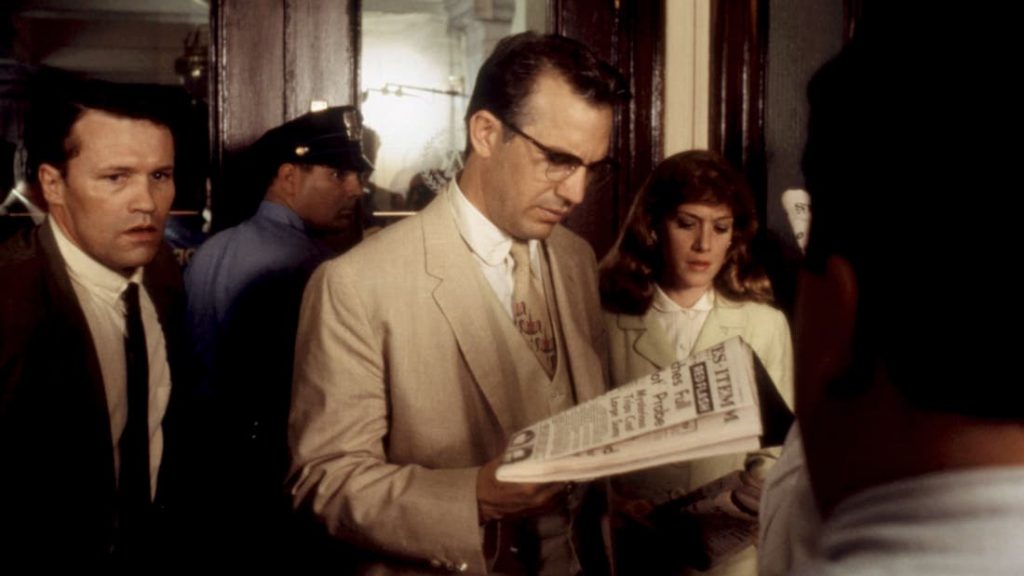
None of this constitutes a flaw; Stone’s intention clearly was to create a kind of Kennedy dossier rather than tell a story of human relationships and struggles. A bit more problematic is the director’s typical tendency to overstatement—as Pauline Kael said, with Stone “everything is in capital letters”.
Ferrie mentions driving to Houston, and Stone shows us a car. Someone says “air base”, and Stone shows us an air base. Someone mentions helicopters in Vietnam, and you can guess what we get footage of next.
This might add visual interest, but the film is hardly lacking in that anyway, and it becomes an irritating tic. More importantly, it typifies the way that JFK just doesn’t know when to stop making the point, and provokes a sneaking suspicion that Stone doesn’t think his audience is quite bright enough to grasp it. (Much the same is true of Platoon.) You sympathise with the judge who puts his head in his hands toward the end of the trial, when Garrison’s rhetoric has gone too far (and at that point Shaw quietly smiles, confident now of acquittal).
What continues to make the film watchable now that the furore surrounding it has died down is nothing to do with Jim Garrison or Clay Shaw or John F. Kennedy, though. It’s the performances, most notably from Jones as Shaw, Pesci as Ferrie and Bacon as O’Keefe.
JFK, like the Stone-scripted Midnight Express (1978),has been accused of homophobia—all three characters are gay, none is really likeable (though Shaw and O’Keefe have surface charm, and Ferrie at least is trying to do the right thing), and an unnecessary scene of a gay orgy is almost comically depraved. There may be some truth in this, though Stone has denied caring about Shaw’s sexuality, but it’s also worth noting that the characters are much more than generic gay men.
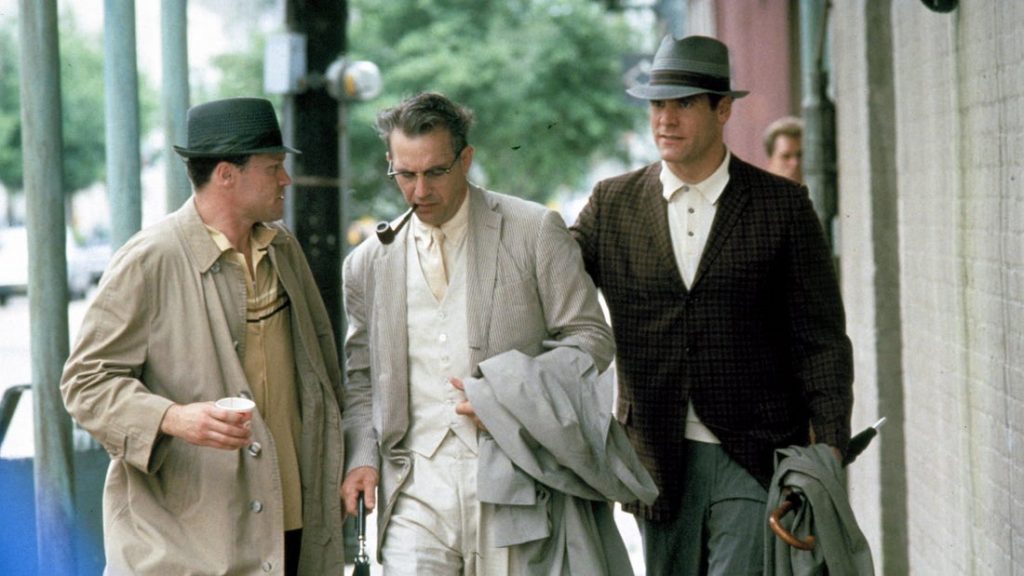
What is really memorable about Shaw is his utterly polite, utterly untrustworthy confidence in his own untouchability as a wealthy, well-connected man. Ferrie is memorable partly because his appearance is ludicrous, but also because the screenplay and Pesci slowly reveal a more complex man who wanted to be a priest; his breakdown in a hotel room is one of the movie’s highlights. Bacon as the male prostitute O’Keefe, meanwhile, has his own very striking scene when his initial affability suddenly turns to vicious hatred.
Costner is a very Stoneian upright hero—the director called him an “idealistic archetype”—but though he is credible enough as a 1960s DA in a relative backwater, he’s not quite dynamic enough to convince as Jim Garrison specifically. He talks about being driven, yet we don’t really feel it. Still, though the movie is nominally about him it’s not really about him at all, and this weakness is slight.
Other stand-outs in a large and star-studded cast (does JFK really need the Walter Matthau cameo, fine though he is?) include Oldman as a haunting Oswald, innocent and confused as a lost sheep; Sanders as Garrison’s assistant Lou; Ed Astner as a private detective; and a wonderful John Candy as another New Orleans lawyer who calls people “Daddy-O” and talks of “big enchiladas”. Sutherland’s Mr. X inevitably comes across as slightly self-parodic—he’s so familiar in similar roles—though the section with him is well-done and fast-moving.
JFK was a substantial commercial success even if critical reception was much more mixed, and not only the continuing fascination with the events of November 1963 but the secrecy over its filming helped to make it into a major media event. It is difficult to separate reactions to the film itself from reactions to its theories about the assassination; Newsweek put “The Twisted Truth of JFK” on its cover, the political reporter Jon Margolis said “there is a point at which intellectual myopia becomes morally repugnant”.
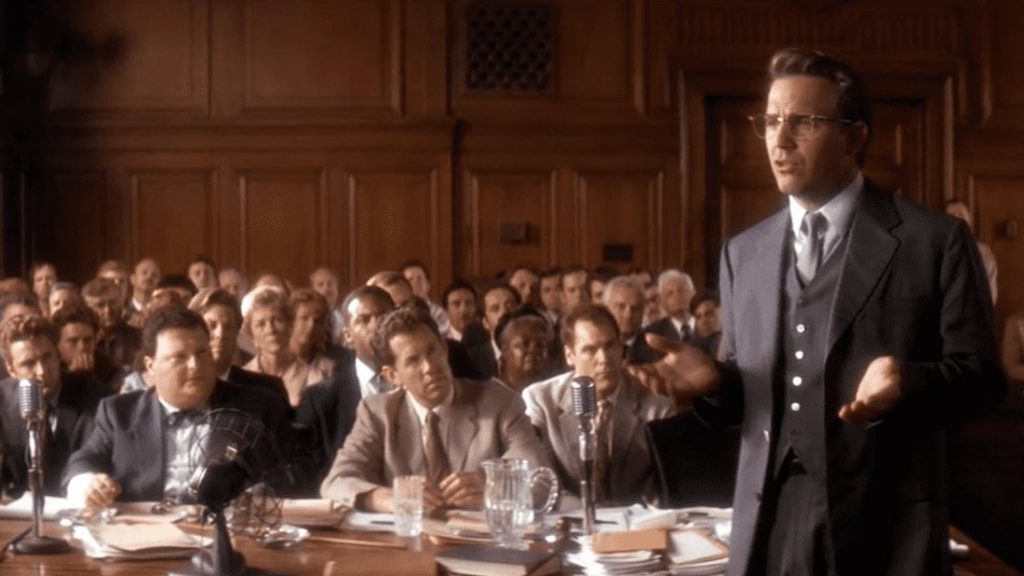
Even the British film critic David Thomson, with less obvious skin in the game, called it “earnest, sincere and crackers… no way for a sane society to come to terms” with a traumatic event like the assassination, though others including Roger Ebert considered it a triumph. At the Academy Awards it won (quite rightly) for ‘Best Cinematography’ and ‘Best Editing’, with Stone, Jones and others also receiving nominations.
Stone has often defended the movie since, and it continues to polarise, not least because theories over the assassination—and, implicitly, theories over the trustworthiness of government—continue to do so. In the current post-Trump, mid-COVID climate it seems unlikely these will go away, and given that the truth about the assassination will probably remain a “mystery wrapped in a riddle inside an enigma” (as Ferrie says in the movie, quoting Churchill) for a long time or even forever, JFK will continue to be a lightning rod for argument.
It had impact in the real world beyond the cinema, in helping to bring about the JFK Records Act of 1992 and establishment of the Assassination Records Review Board, intended to create greater openness around the assassination. And it has indisputable impact in the cinema too: for all that Stone can be rather repetitious, this is not a film that can leave anybody bored for a moment, or lacking in an opinion afterwards.
But even in the most charitable interpretation, its postmodern approach to truth is potentially confusing to audiences. It’s a fine film in many respects, but is it really the film that someone styling himself a “cinematic historian” ought to have made?
USA • FRANCE | 1991 | 188 MINUTES (THEATRICAL CUT) • 205 MINUTES (DIRECTOR’S CUT) | 2.39:1 | COLOUR • BLACK & WHITE | ENGLISH • SPANISH
director: Oliver Stone.
writers: Oliver Stone & Zachary Sklar (based on ‘On the Trail of the Assassins’ by Jim Garrison & ‘Crossfire: The Plot That Killed Kennedy’ by Jim Marrs.
starring: Kevin Costner, Kevin Bacon, Tommy Lee Jones, Laurie Metcalf, Gary Oldman, Michael Rooker, Jay O’ Sanders & Sissy Spacek.
